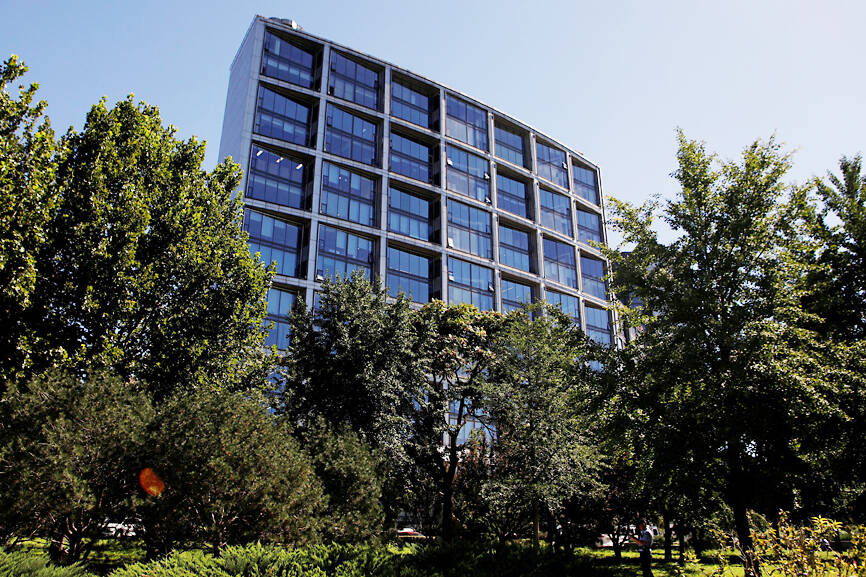Chinese authorities said they recently opened criminal investigations into Zhongzhi Enterprise Group Co’s (中植企業) money management business, days after the embattled shadow banking giant revealed a shortfall of US$36.4 billion in its balance sheet.
Police in Beijing said in a statement on WeChat that they took “criminal mandatory measures” against multiple suspects, identifying one by their last name, Xie (解). They urged investors to report cases or provide leads to the authorities, including filing complaints online. Xie Zhikun (解直錕), the group’s founder, died in 2021, but several of his relatives are executives at the company.
The statement did not elaborate on what the measures entail or what crimes they might have committed.

Photo: Reuters
The legal terminology used to describe the situation was similar to that used in the case of Evergrande Group’s (恆大集團) billionaire chairman Hui Ka Yan (許家印). Evergrande said in September that Hui was suspected of committing crimes.
The mandatory or coercive measures could take several forms, including summons, release on bail and residential surveillance, and detention and arrest, according to Chinese procedural law. The measures can be enforced by the police, courts or prosecutors.
Prior to Evergrande’s Hui, similar measures were taken against some staff of the money management business of the developer at the center of China’s property crisis, a police statement in September showed.
Privately owned Zhongzhi earlier last week revealed the depth of its financial difficulties, telling investors it is “severely insolvent” with a shortfall of US$36.4 billion.
The wealth manager said liquidity has dried up and the recoverable amount from asset disposals is expected to be low, a letter sent to investors on Wednesday showed.
Zhongzhi first triggered concern in August after one of its trust-company affiliates failed to make payments to customers on high-yield investment products. The group’s financial difficulties add to Chinese President Xi Jinping’s (習近平) challenges as officials grapple with a property crisis and a weak economy.
The firm said the death of its founder, Xie, and the subsequent departure of senior executives had led to a failure of internal management. Previous efforts at a “self-rescue” did not meet expectations, Wednesday’s letter showed.
Those affected by Zhongzhi’s troubles are likely to be wealthy individuals. Shadow banks such as Zhongzhi are loosely regulated firms that pool household savings to offer loans to invest in real estate, stocks, bonds and commodities. In recent years, even as rival trusts pared risks, Zhongzhi and its affiliates, especially Zhongrong International Trust Co (中融國際信託), extended financing to troubled developers and snapped up assets from companies, including Evergrande.
Authorities on Saturday called on Zhongzhi’s investors to “actively cooperate with the police investigations and protect own[er’s] rights and interests through legal channels” to help retrieve criminal proceeds and recover their losses.

When an apartment comes up for rent in Germany’s big cities, hundreds of prospective tenants often queue down the street to view it, but the acute shortage of affordable housing is getting scant attention ahead of today’s snap general election. “Housing is one of the main problems for people, but nobody talks about it, nobody takes it seriously,” said Andreas Ibel, president of Build Europe, an association representing housing developers. Migration and the sluggish economy top the list of voters’ concerns, but analysts say housing policy fails to break through as returns on investment take time to register, making the

NOT TO WORRY: Some people are concerned funds might continue moving out of the country, but the central bank said financial account outflows are not unusual in Taiwan Taiwan’s outbound investments hit a new high last year due to investments made by contract chipmaker Taiwan Semiconductor Manufacturing Co (TSMC, 台積電) and other major manufacturers to boost global expansion, the central bank said on Thursday. The net increase in outbound investments last year reached a record US$21.05 billion, while the net increase in outbound investments by Taiwanese residents reached a record US$31.98 billion, central bank data showed. Chen Fei-wen (陳斐紋), deputy director of the central bank’s Department of Economic Research, said the increase was largely due to TSMC’s efforts to expand production in the US and Japan. Investments by Vanguard International

WARNING SHOT: The US president has threatened to impose 25 percent tariffs on all imported vehicles, and similar or higher duties on pharmaceuticals and semiconductors US President Donald Trump on Wednesday suggested that a trade deal with China was “possible” — a key target in the US leader’s tariffs policy. The US in 2020 had already agreed to “a great trade deal with China” and a new deal was “possible,” Trump said. Trump said he expected Chinese President Xi Jinping (習近平) to visit the US, without giving a timeline for his trip. Trump also said that he was talking to China about TikTok, as the US seeks to broker a sale of the popular app owned by Chinese firm ByteDance Ltd (字節跳動). Trump last week said that he had

STRUGGLING TO SURVIVE: The group is proposing a consortium of investors, with Tesla as the largest backer, and possibly a minority investment by Hon Hai Precision Nissan Motor Co shares jumped after the Financial Times reported that a high-level Japanese group has drawn up plans to seek investment from Elon Musk’s Tesla Inc to aid the struggling automaker. The group believes the electric vehicle (EV) maker is interested in acquiring Nissan’s plants in the US, the newspaper reported, citing people it did not identify. The proposal envisions a consortium of investors, with Tesla as the largest backer, but also includes the possibility of a minority investment by Hon Hai Precision Industry Co (鴻海精密) to prevent a full takeover by the Apple supplier, the report said. The group is